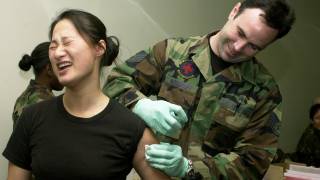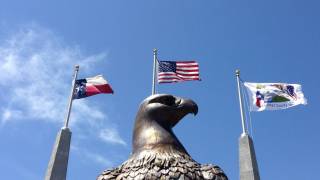17 Additional Mumps Cases At College of Charleston

President Andrew T. Hsu, Ph.D., of the College of Charleston (CoC), informed the South Carolina community that a total of 43 mumps cases were confirmed among members of our campus since the outbreak began on September 23, 2019.
This November 14, 2019, statement from President Hsu indicates 17 mumps virus cases were confirmed during this past week.
The good news within this statement is the vast majority of these mumps cases, which are viral infections, are now no longer infectious.
‘While these new positive cases are not unexpected, my administration and I continue to take this public health threat extremely seriously. And you should, too.'
‘In the meantime, every member of our campus community can and should take steps to safeguard themselves and others against mumps, concluded President Hsu.
Listed below are 5 things the CoC says you can do to help curtail this mumps outbreak:
- GET VACCINATED: The South Carolina Department of Health and Environmental Control and the Centers for Disease Control and Prevention are now recommending an additional dose of the measles, mumps, and rubella (MMR) vaccine especially for students involved in fraternity and sorority activities, due to known risks factors inherent in this population. A targeted vaccine clinic will be held on campus early next week for fraternity and sorority members and for those students associated with the fraternity and sorority community. However, the clinic will be open to all students, faculty, and staff.
- PRACTICE GOOD HYGIENE: Cover your mouth when coughing or sneezing; do not share food, drinks, eating utensils, cigarettes or vaping devices; and avoid activities that may result in saliva exposure. Wash your hands frequently; clean and disinfect surfaces.
- SELF-ISOLATE: If you have symptoms of mumps or are awaiting the results of a mumps test, take responsible measures to prevent the spread of mumps and stay away from others for five days. That means no class, no campus events, no parties, and no sports.
- MONITOR YOUR HEALTH: If you have had close contact with someone symptomatic with the mumps, monitor yourself for possible symptoms.
- BE VIGILANT: The spread of mumps commonly occurs in social settings, such as parties. If you plan on attending parties or events where you will be in close proximity to other people, be vigilant about your hygiene habits and those of others.
In the coming days and weeks, health professionals from Student Health Services will be available to answer questions from students about the mumps outbreak from 4:30 p.m. to 6 p.m. on November 18 in the lobby of the Stern Student Center, on the CoC campus.
‘So please do your part to keep our campus community healthy,’ concluded President Hsu.
Across the east coast, there are several universities reporting mumps cases as of November 14th. The following mumps virus outbreak information was available online:
- Elon University, NC - 10 cases
- High Point University, NC - 20 cases
- University of North Carolina- Greensboro, NC - 1 case
- Moravian College, PA - 12 cases
Mumps is a contagious disease that is caused by a virus. It typically starts with a few days of fever, headache, muscle aches, tiredness, and loss of appetite. Then most people will have swelling of their salivary glands.
This is what causes the puffy cheeks and a tender, swollen jaw, says the Centers for Disease Control and Prevention (CDC).
Outbreaks have most commonly occurred among groups of people who have prolonged, close contact, such as sharing water bottles or cups, kissing, practicing sports together, or living in close quarters, with a person who has mumps.
Most colleges in the USA require the MMR vaccine series for all matriculated students. However, the CDC says it’s important to note that even people who have previously had 1 or 2-doses of the MMR vaccine can still contract mumps. Some vaccinated people may still get mumps if they are exposed to the virus.
However, disease symptoms are milder in vaccinated people.
The mumps vaccine protects against the mumps virus genotype G, the most frequently detected genotype detected in the United States, says the CDC.
At the onset of a suspected mumps outbreak, patients suspected to have mumps should be tested by RT-qPCR to confirm mumps and rule out other possible etiologies says the CDC.
>> Private Mumps Testing <<
Previously, the CDC's Advisory Committee on Immunization Practices approved the 3rd dose of MMR vaccine for groups of people who are at risk because of an ongoing mumps outbreak.
In the USA, there are 2 vaccines, MMR-II and ProQuad approved for mumps virus protection.
Mumps Outbreak news published by Precision Vaccinations
Our Trust Standards: Medical Advisory Committee

























